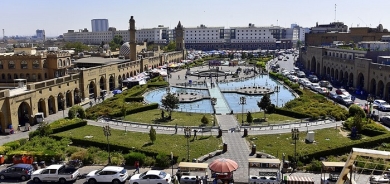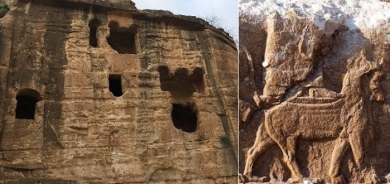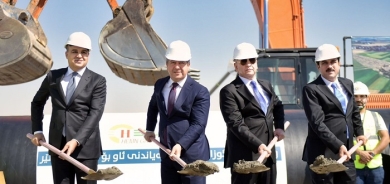President Nechirvan Barzani: A new vision is needed to resolve Iraq’s problems

Kurdistan Region President Nechirvan Barzani attended the “Iraq; a Tragic Destiny” conference in Erbil on Saturday. A number of Ambassadors, Council Generals, University Professors and Academics also took part in the conference.
The President delivered the following speech on the status of the political process in Iraq and solutions to its lingering problems:
Ladies and Gentlemen,
Good morning and welcome,
I would like to thank the arrangers of this conference and their efforts. I wish them success and hope that this conference will generate constructive recommendations and outcomes.
I may not need to go back to the conditions surrounding the establishment of Iraq and the countries in this region a century ago, or elaborate on the unnatural circumstances which led to the formation of these countries without considering the will and the rights of the people of Kurdistan. I leave this for the esteemed experts and participants of this conference.
Undoubtedly, the people of Kurdistan, and all its communities, have endured much during these hundred years. Unfortunately, the people of Kurdistan still struggle to achieve their lawful rights a century later. Very much similar to their past history, the people of Kurdistan are still anxious about their conditions, and fear the future.
Iraq is the land of its communities and components. Right from its establishment, it consisted of three states of Mosul, Baghdad and Basra. These three states were different from one other geographically and culturally. Kurds in the north, Sunnis in the centre and Shiites in the south of the country. In addition to that, there are also a number of other religious and ethnic communities. Iraq is a multicultural and multireligious country.
In my view, Iraq’s main problem- as in the case of any multinational and multireligious country- is about power and governance. It is only natural that in such a country, there are different opinions and beliefs. This will become a problem when one side tries to impose its opinions on all other sides, or if it resorts to force or punishment to resolve disputes, as has been the case throughout Iraq’s history.
Ladies and Gentlemen,
Right from the establishment of Iraq in 1921, Baghdad was ruled by the logic of power, which led to all the tragedies and devastations that the country has been witnessing. An Iraq which is rich in natural resources, rich in manpower, rich in terms of ethnic, religious and multicultural communities, and situated in a geographically strategic position, if it was not due to that logic of power, Iraq would have been one of the powerful countries of the region.
The same mistakes have been repeated for the past hundred years. Iraq draws no lessons from the bitter experiences of the past, from the constant failures, from the unending wars, from the high price and devastation that the peoples and communities of Iraq have paid and endured.
Why instead of being a powerful and developed country, Iraq is still ranked in the bottom, with its institutions paralyzed, its cities among the most dangerous of the world to live in, and its citizens still suffer from lack of the most basic public services?
The people of Iraq deserve much better life, better opportunities now and better future. They deserve a life that gradually heals the wounds and agonies of the past and helps them take steps towards the future with optimism. This is only possible by being realistic, understanding the issues and agreeing on a new vision to resolve the problems of the country. Imposing the will of the majority on the minority, establishing militias, curbing the institutions, tribalism, threatening to start civil wars and promoting elitist mentality will never prevail.
The rulers of Iraq should no longer be prisoners of a bitter past. In order for Iraq to become a country for all, an advanced, reconstructed and stable country, a country of hope for present and future generations, we all need to recognize our errors courageously and renounce the desire to impose our will on others and repeat the mistakes of the past. Peace and stability in Iraq depend on peace and stability in the region and in the world.
The past patterns and experiences are not far distant from us. If Iraq does not retain peace and stability, the region will see no peace and stability. Iraq was not peaceful and stable and as a result it led to the creation of ISIS. If nothing changes, if Iraq’s problems are not resolved and the same political mistakes, marginalization of communities, the same logic of power, and dictating and sidelining the others are continued, there will be new ISIS networks. The same story of ISIS, but worse, will be repeated. And then the peace and stability of the region and the world will be compromised.
The solution to the problems of Iraq is the resolution of the problems of the Kurdistan Region with Iraq. Iraq has avoided resolving the disputes with the people of Kurdistan for the past hundred years. And it has been without peace and stability for the past hundred years. For the past hundred years, all of Iraq’s might and riches have been spent on arms and warfare. It has brought nothing but destruction, hardships and tragedies for the people of Iraq.
What I would like to convey is the following: Erbil and Baghdad’s peace and stability are interrelated. The path to peace and stability for Paris, London, Washington crosses through Erbil and Baghdad. Stable Erbil and Baghdad mean a peaceful Iraq in the Middle East. Which is why the international community has the duty to support Iraq to resolve its issues.
In the new Iraq, Kurdistan is a constitutional region. A federal region means that it is a main part of Iraq as a federal country. Federalism for us means two things: first, take part in the state’s institutions, including financial, military and political institutions. Second, distributing power according to geography. This is the essence of federalism, which in the new Iraq has been imposed by the constitution.
When we say that Kurdistan, after the collapse of the former regime, voluntarily became a part of Iraq, it means that it must be a genuine partner in the federal Iraq; take genuine part in power and all its forms. This is what ensures stability and territorial integrity of the new Iraq. Thus, the fundamental solution to the main problem in Iraq is partnership and power sharing among all communities and components and in decision-making.
All components in Iraq have their duties, but the main duty of all components is to implement and apply the constitution. The Kurdistan Region invites all parties to implement and impose the constitution and hence, enact federalism. Rights and responsibilities come together. If the federal power in Baghdad grants the constitutional rights of the Kurdistan Region, the Kurdistan Region will fulfill its constitutional duties fully as well.
We, the people of Kurdistan and Iraq’s communities have come far together. We have seen many ups and downs and uncertainties. We have overcome many hardships. At the same time, we have come to realize that Iraq belongs to all its components. Therefore, it will not work if only one component tries to rule Iraq and marginalizes others. The past regimes have all gone this path and failed, while the people of Iraq have paid the price.
Now, after all the bitter past and experiences, the message of the Kurdistan Region in the federal Iraq is the message of peace, tolerance and coexistence. It is an invitation to all Iraqi sides that we all need to draw lessons from the past, and together, with a new common and open thought and vision, see the problems of the country and try to find solutions. The past experiences have proven that slogans alone will not solve the issues. We need to approach the problems realistically and resolve them correctly.
Our message is to bring all sides together for a new deal and new era in Iraq. To serve the citizens better and provide a better livelihood. A process in which all sides are winners, which brings peace and stability with it and which needs all of us; no one remains outside.
In the new Iraq, trust and assurance must prevail. For this solution, all of us must take further steps towards each other. We must reinstall assurance and trust so that all communities feel peace and stability. Trust, peace and stability will return when majorities and minorities, Kurds and Arabs, Turkmen, Assyrians, Syriac, Chaldeans and Armenians, Muslims and Christians, Shiites and Sunnis, Yezidis, Kakayis, Sabia and all faiths and nations work together.
Ladies and Gentlemen,
This is true also for the Middle East. There are different peoples, nations, faiths, religions, sects and opinions in this region, but shared history and geography will bring all of them together. The history of the past was oppression, annihilation, denial, deprivation and the use of force. This has created a difficult twist that needs to be untied. And who will benefit from the instability and wars? Hundred years of wars, chaos and tensions have gripped this region, its societies and its peoples.
Rejecting and denial of identity, whether national, religious, faith related, sectarian, racial or any other forms of denial will lead to protests and reactions and end in wars and destruction. The modern transformations, the advances of the world and the interests prove that resolving the issues will no longer be possible through old ways and methods.
All of us in the Middle East must find a way to bring about coexistence, mutual respect, tolerance and partnership. We need to come together and create common interests, security and economic systems in which everyone is a winner.
Peaceful coexistence is the cornerstone of a bright future for the Middle East. It is important that history and the past are not employed only to draw lessons from. Let humanity to bring us all together here in Iraq, in the Middle East and in the entire world.
In the end, I hope that today these esteemed experts, who will tell us about the history of Iraq, also remind us of important lessons that we hopefully benefit from for the future; a future which is for all, and in which everyone will live in peace, have trust and is granted assurances.
I thank you and wish you a nice day.














